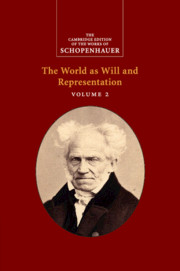Chapter 23 - On the Objectivation of the Will in Nature Devoid of Cognition
Published online by Cambridge University Press: 30 June 2022
Summary
The fact that the will we find within us does not originally stem from cognition, as philosophy has so far assumed, as a mere modification of cognition, which is to say something secondary, derivative, and, like cognition itself, conditioned by the brain; but rather that it is what is prior to consciousness, the kernel of our essence and the primal force that itself creates and maintains the animal body by carrying out its unconscious as well as conscious functions; – this is the first step towards a basic understanding of my metaphysics. As paradoxical as it now seems to many people that the will is in itself devoid of cognition, even the scholastics have realized and recognized this fact to some extent, since Giulio Cesare Vanini (that well-known victim of fanaticism and priestly wrath), who was thoroughly versed in scholastic philosophy, said in his Amphitheatre, p. 181: ‘the will is a blind power, in the view of the scholastics’. – The fact that this very same will is what puts the bud in the plant in order to develop it into a leaf or flower, indeed, that the regular form of the crystal is only the remaining trace of its momentary striving, that it underlies all the forces of inorganic nature too as the true and exclusive automaton (in the proper sense of the term), playing and acting in all of its manifold appearances, empowering its laws, and making itself known in even the crudest mass as gravity – this insight is the second step in this fundamental understanding, and is introduced by a further reflection. It would be the crudest of misunderstandings to think that this is only a matter of a word for describing an unknown quantity: we are in fact articulating the realest of all real knowledge. For we are taking what is completely inaccessible to our immediate cognition, and hence what is essentially foreign and unfamiliar, which we describe as a force of nature, and reducing it to something with which we are most precisely and intimately acquainted, but which is immediately accessible to us only in our own being; this is why it needs to be transferred from this to other appearances.
- Type
- Chapter
- Information
- Schopenhauer: The World as Will and Representation , pp. 305 - 316Publisher: Cambridge University PressPrint publication year: 2018

